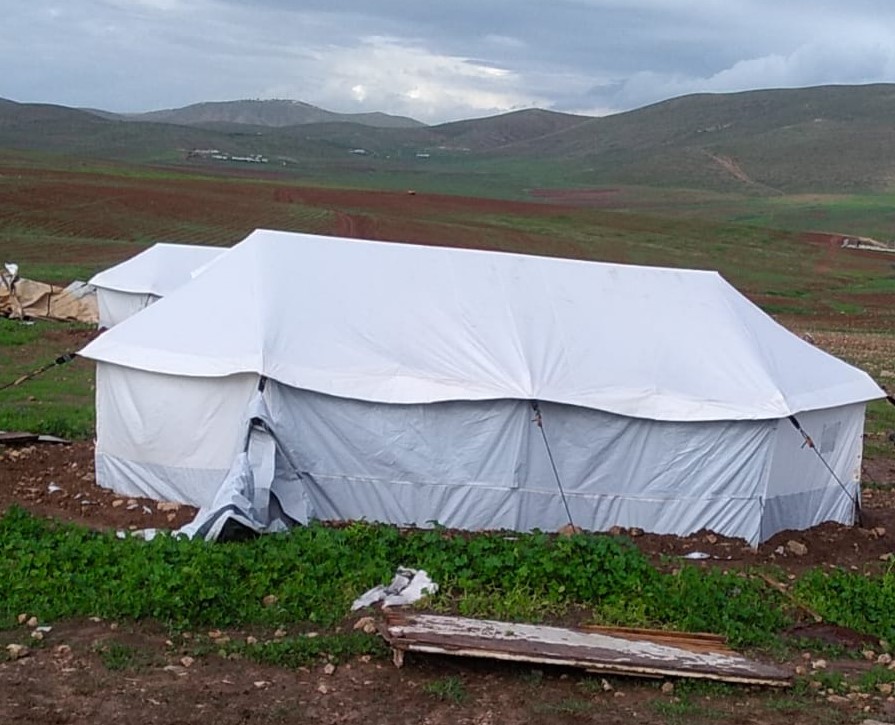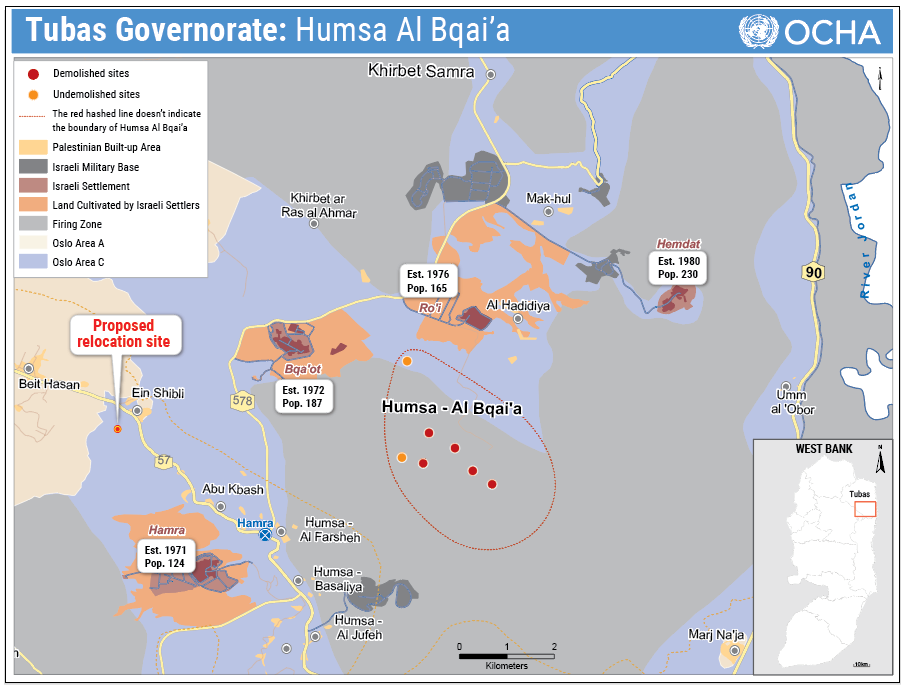Humsa al Bqai'a | Flash Update #4
Highlights
- Although no further demolitions or confiscations have occurred in Humsa - Al Bqai’a since the last update on 16 February, the community remains largely unprotected and the response limited. Due to the heavy military presence and fear of further confiscation/ interception, partners continue to deliver residential and animal shelter, fodder and WASH structures outside of the community itself, which is not always being accessed.
- The community’s vulnerability was compounded by the severe winter conditions this week. While unsuitable for long-term use, the emergency shelters and winterization items that partners succeeded in delivering have, so far, provided some protection for the community and their livestock.
- Since the start of 2021, the Israeli authorities have demolished, seized or forced people to demolish at least 199 Palestinian-owned structures, including 77 donor-funded, displacing 285 people, including some 150 children. This represents an over 200 per cent increase in structures targeted, and an over 500 per cent increase in donor-funded structures targeted, compared to the equivalent period in 2020.
- Concerns remain over the imminent risk of forcible transfer facing affected families.

Situation overview
The Palestinian Bedouin community of Humsa - Al Bqai’a, is located in Area C in the northern Jordan Valley, mostly in an area designated as a ‘firing zone’ for Israeli military training, where Palestinian residency or access is prohibited. The community has suffered from multiple large demolitions and confiscations in recent months, which have resulted in the displacement of over 60 people, including 35 children. According to representatives, the community was informed by the ICA that they have been assigned to a relocation site near the village of Ein Shibli. The community has made appeals to the courts and rejected previous proposals to be moved to another location.
On 16 February, the Israeli Civil Administration confiscated five animal shelters, which the community was attempting to install in advance of a severe winter storm. On the same day, an advocacy visit involving the diplomatic and humanitarian community took place, with the delegation accessing the site and meeting with community members.
Humanitarian response & ongoing needs
Since the most recent round of demolitions began on 1 February 2021, humanitarian partners have distributed emergency shelters, food and essential household items, much of which has been confiscated or damaged by Israeli forces. The ongoing demolitions are taking place in the midst of the COVID-19 pandemic and the lack of adequate shelter is impeding the necessity for social distancing and other recommended safety measures.
- Protection: In addition to the trauma ensuing from repeated demolitions and the risk of further displacement, community members are experiencing high stress levels, due to a lack of basic needs, and with the lack of privacy also emerging as a key concern. Protection partners conducted a Protection partners conducted a joint assessment on 15 and 16 February, which revealed child protection concerns, and Mental Health and Psycho-Social Support Service (MHPSS) needs, the lack of basic items (e.g. mattresses, pillows, winter clothes) and the need for primary healthcare for chronic patients and children. Prior to the assessment, 34 community members, including 11 children affected by the demolitions in early February received emergency psychosocial support, which was conducted over the phone.
Protection interventions will continue in the form of physical visits and the provision of remote support. Partners are monitoring community members identified as severely affected and in need of psychosocial support and are provding Child Protection Case Management for children in particular need of assistance. Partners will also provide parenting sessions and support to help children cope with traumatic situations and conduct remote stress management sessions for caregivers. - Shelter & NFI: While shelter partners have managed to deliver emergency shelters, a more durable response is needed in the form of residential tents. In anticipation of this week’s winter storm, some families managed to set up some longer-term structures provided earlier by Shelter partners. On 17 February, partners provided winterization items, as protection against the heavy rain and storm. Partners continue to face problems in accessing the community, forcing them to conduct remote distributions.
- WASH: WASH-related needs remain critical. Although 20 water tanks were provided after the November 2020 demolition, water vendors are reluctant to enter the area to refill these tanks, due to fear of arrest or confiscation. The community is currently using two-wheeled water tanks to transport water at night from a nearby source, but this can take up to four hours and is not enough for domestic and agricultural use. At the request of the community, PRCS delivered 11 hygiene kits on 18 February.
- Health: Findings from the protection assessment conducted on 14 and 15 February indicate a need for primary healthcare services. Health partners providing mobile clinic services in the area will meet to discuss the best means of meeting the health needs of the community.
- Food Security: The need for fodder and shelter for livestock remains critical. On 17 February, winterization items for both residence and livestock were provided to the community. Partners have organized a veterinarian visit for vaccination and treatment of animals once the weather allows. Food assistance was provided to the community at the end of December/beginning of January, with the next distribution planned for mid-March. On 18 February, at the request of the community, the Palestine Red Crescent Society (PRCS) delivered 11 food parcels to affected families.
- Education: There is no primary or secondary school in the community, Around 20 children attend Frush Bet Dajan School and live with extended family members closer to the school on weekdays. The children are in need of MHPSS, due to the fear and stress they are experiencing from the ongoing demolitions. Education partners are coordinating a response with the Ministry of Education to provide MHPSS and materials support to all Frush Bet Dajan school students.
Demolitions, displacement and the risk of forcible transfer
International humanitarian law (IHL) requires an occupying power to protect the population of the territory that it occupies, ensure its welfare and wellbeing, as well as the respect for its human rights. Any destruction of property by the occupying power is prohibited, except when rendered absolutely necessary by military operations, which is not relevant in the West Bank where there are currently no active hostilities. The extensive demolition of property is a grave breach of the Fourth Geneva Convention and may amount to a war crime. Other than for the security of the population or imperative military reasons, IHL further prohibits the transfer of the population of an occupied territory without the genuinely and fully informed consent of the affected people, regardless of the motive. Consent is not considered genuine in an environment marked by the use, or threat, of physical force, coercion, fear of violence or duress. In the absence of such consent, the transfer is forcible and constitutes a breach of the Fourth Geneva Convention.










